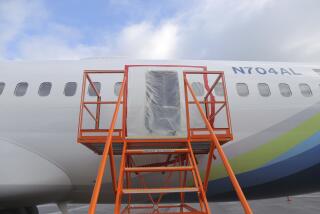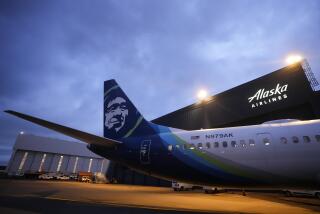NTSB to open hearings on Asiana Airlines crash
Federal safety officials will hold an investigative hearing starting Tuesday to explore the Asiana Airlines crash in San Francisco that killed three passengers and injured more than 180 in July.
On Tuesday and Wednesday in Washington, the National Transportation Safety Board will address issues related to the crash, including pilot training, the effect of highly automated flight systems on pilot awareness, aircraft cabin safety and the emergency response of public safety agencies.
The crash occurred July 6 when the Asiana Boeing 777 struck a sea wall and slammed into the runway while attempting to land at San Francisco International Airport. Investigators have said the pilots came in too low and too slow to touch down safely.
The tragedy has raised questions about the training and skills of the Asiana pilots, government oversight in South Korea and automated flight systems, which the crew was relying on during the landing. In addition, an emergency vehicle on its way to the crash site struck and killed an injured passenger who was covered with firefighting foam on the runway.
During trips to South Korea, NTSB officials interviewed Asiana personnel, studied records of the plane that crashed and reviewed the airline’s policies and training procedures.
The NTSB has also examined the contents of the flight data recorders or so-called black boxes. Investigators are further examining the type of evacuation slides used in the Asiana Boeing 777. During the crash, only two of the eight slides inflated properly. Two deployed inside the cabin, delaying the evacuation, and had to be deflated with axes.
In the aftermath, Asiana officials said last week they plan to overhaul the airline’s safety procedures, but no specifics were offered.
In September, the airline announced that in an effort to sharpen pilot skills, it would increase the hours of flight simulator training for landing at airports that do not have automated guidance systems.
The carrier also vowed to hire consultants to evaluate its procedures, add safety specialists and improve maintenance procedures. Meanwhile, the South Korean government is considering more stringent airline safety standards, including more training requirements and tougher penalties for accidents that result in casualties.
Transportation agency board members are scheduled to take testimony from more than 20 witnesses, including experienced Boeing Co. pilots, aeronautical engineers, South Korean aviation officials, Federal Aviation Administration officials, experienced flight instructors, safety experts, a training manager and the chief pilot for Asiana Airlines.
More to Read
Sign up for Essential California
The most important California stories and recommendations in your inbox every morning.
You may occasionally receive promotional content from the Los Angeles Times.











